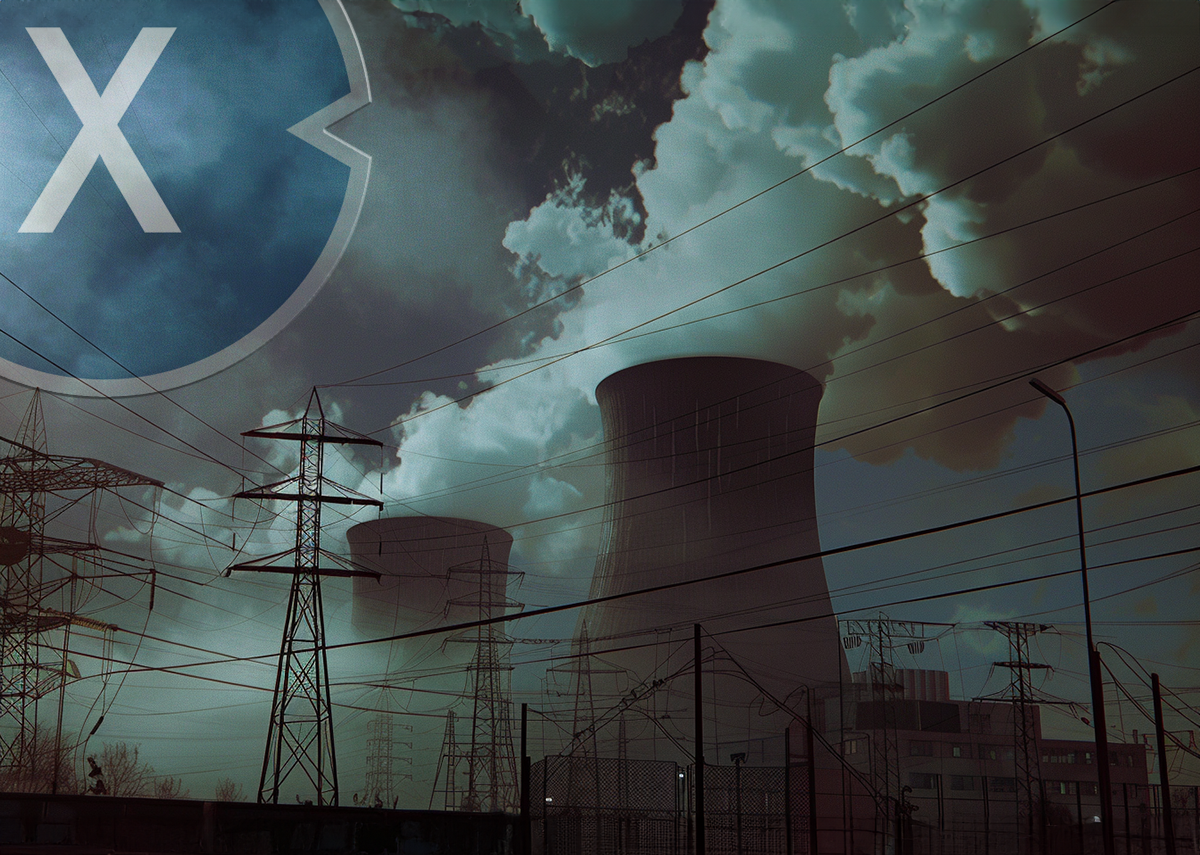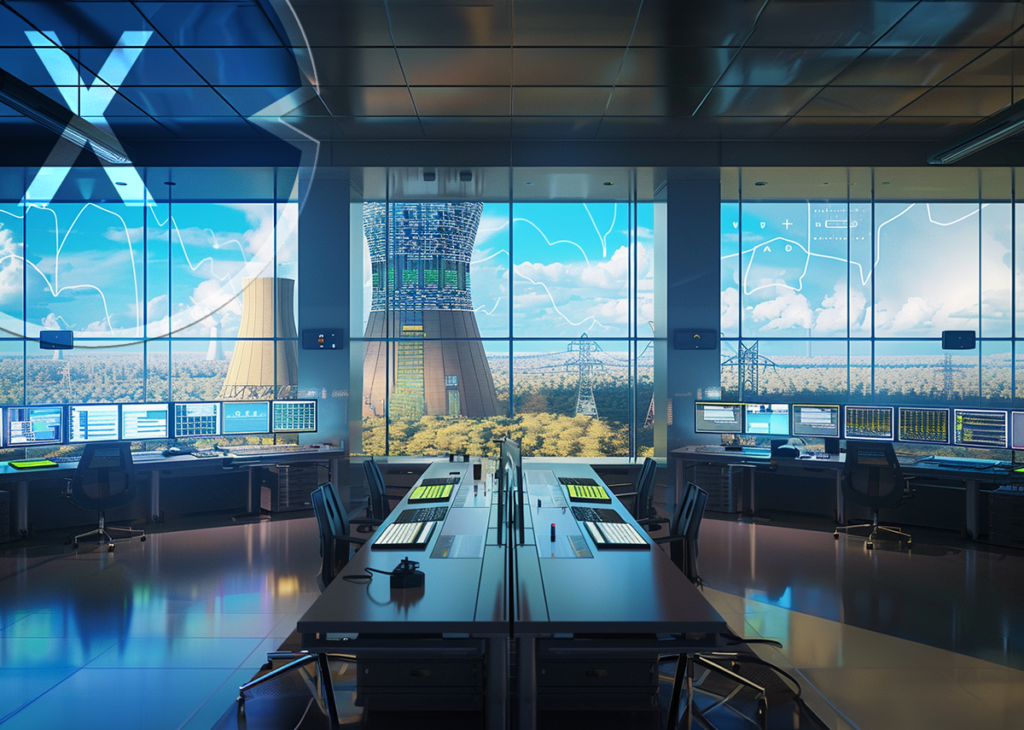US nuclear power plant as a sustainable future solution for Microsoft data centers? Brilliant or declaration of bankruptcy?
Language selection 📢
Published on: September 23, 2024 / Update from: September 23, 2024 - Author: Konrad Wolfenstein

The reactivation of a reactor that has been shut down for such a long time is not only a major challenge technically, but also legally and politically. The Three Mile Island facility is best known for the 1979 incident in which there was a partial meltdown in Unit 2 of the plant - the worst accident in U.S. nuclear power history. Unit 2 was then never put back into operation. Unit 1, on the other hand, remained in operation until 2019, but was then shut down because the energy supply in the region could be secured from other sources and the economic pressure on nuclear power in the USA continued to increase.
🔌🚀 The planned restart of a decommissioned reactor
⚛️ The planned re-entry into the energy supply of a decommissioned reactor at the US nuclear power plant Three Mile Island has attracted great attention not only in the energy industry, but also in the technology industry and politics. The reactivation of this reactor, specifically Unit 1 of the nuclear power plant in the state of Pennsylvania, is intended to meet the growing demand for electricity for Microsoft data centers. These data centers are increasingly burdened by the energy hunger of modern technologies, especially artificial intelligence (AI).
💡 The plan to reactivate the reactor
The reactor is scheduled to be reactivated in 2027. Constellation Energy, the company responsible for operating the nuclear power plant, has said that restarting the reactor can only occur under certain conditions. One of the most important prerequisites is clarifying how the electricity generated will be fed into the grid. Joe Dominquez, the CEO of Constellation, said in an interview that the final decision depends on the regulations and conditions of the electricity market. It must be ensured that the demand for nuclear energy in this form will continue to exist in the long term.
The reactivation of a reactor that has been shut down for such a long time is not only a major challenge technically, but also legally and politically. The Three Mile Island facility is best known for the 1979 incident in which there was a partial meltdown in Unit 2 of the plant - the worst accident in U.S. nuclear power history. Unit 2 was then never put back into operation. Unit 1, on the other hand, remained in operation until 2019, but was then shut down because the energy supply in the region could be secured from other sources and the economic pressure on nuclear power in the USA continued to increase.
🌐 The role of Microsoft and the increasing energy demand
The reactivation of the reactor is directly related to the growing demand for electricity, particularly from the technology industry. Microsoft is one of the world's largest providers of cloud services that require immense computing power. With the increasing use of AI technologies, electricity consumption continues to rise. AI applications, especially those based on machine learning and neural networks, require enormous amounts of computing capacity. This computing power is provided in large data centers, which, however, can only work efficiently if they are continuously supplied with sufficient power.
In recent years, Microsoft has made great efforts to optimize its energy consumption and reduce its carbon footprint. The company is committed to being climate neutral by 2030, which also includes the use of renewable energy. At the same time, however, Microsoft needs stable and reliable energy sources to ensure the availability of its services around the clock. Nuclear energy is seen as a possible solution in this regard, as it can ensure a constant power supply without interruptions compared to renewable energies.
The fact that a technology company like Microsoft wants to use nuclear energy raises interesting questions. It shows that despite the global trend towards renewable energy, nuclear power could still play an important role in energy supply, especially in areas where the need for continuous electricity supply is high. “The growing energy demands of data centers, particularly from AI, require a stable energy source that is available 24/7,” said a Microsoft spokesperson. “Nuclear energy could play an important role here as it is both reliable and low-carbon.”
🔮 A look at the future of energy supply
The reactivation of the reactor at Three Mile Island could be seen as a pioneering example of the future use of nuclear power in the modern energy industry. In many countries, nuclear power is controversial for safety and environmental reasons, and the expansion of renewable energy is seen as the long-term solution. But the case of Three Mile Island shows that nuclear power could represent a bridging technology until renewable energy is available in sufficient quantities to meet global energy needs.
The decision to reactivate this reactor is also symbolic of the changes in US energy policy. In recent years there has been a significant decline in the use of nuclear energy in the United States. Numerous nuclear power plants were shut down because the operating costs were considered too high compared to renewable energies and fossil fuels. But with growing pressure to reduce CO₂ emissions while ensuring a stable energy supply, nuclear power could become increasingly important again. “The reactivation of Three Mile Island shows that the USA may again rely more on nuclear power to meet the challenges of the energy transition,” said an energy expert.
🔧 Challenges and opportunities
Of course, there are also concerns about restarting a nuclear power plant that has been shut down for years. Safety standards in the nuclear power industry have improved significantly since the 1970s, and modern reactors are far safer than older plants. Nevertheless, the risk of accidents and the handling of radioactive waste remain a major issue. Proponents of nuclear power argue that the technology is safe when properly maintained and operated. Critics, however, point to the potential dangers and the unresolved issue of final disposal of nuclear waste.
Another factor that plays a role in recommissioning is the high cost. Reactivating such an old reactor requires extensive investment in modernizing the plant to meet current safety standards. In addition, technical challenges must be overcome as some of the power plant's systems and components may become obsolete and need to be replaced.
On the other hand, the use of nuclear power plants like Three Mile Island also offers economic benefits. The facility could not only provide Microsoft with power, but also help meet the region's growing energy needs. This could create jobs and promote economic development in Pennsylvania. “A renewed use of nuclear energy could not only bring economic benefits to the region, but also provide a solution to growing energy needs,” said a local politician.
⚡ Modern energy policy?
The potential reactivation of the Three Mile Island reactor is emblematic of the complex challenges and opportunities associated with modern energy policy. On the one hand, there is the increasing demand for energy, particularly from the technology industry, which is increasingly dependent on reliable and powerful energy sources. On the other hand, there are significant concerns about the safety and costs associated with the use of nuclear power.
Microsoft's interest in using nuclear energy shows that large technology companies are looking for stable and climate-friendly energy sources. The decision to rely on nuclear power may come as a surprise to some, but it reflects the reality that renewable energy alone may not be enough to meet the world's growing energy needs. The future of energy supply is therefore likely to be a mix of different sources - including nuclear energy.
Whether the reactivation of Three Mile Island actually takes place remains to be seen. What is clear, however, is that the discussion about the use of nuclear power will continue to gain in importance in the context of the modern energy and technology industries. It remains exciting to see how this development will affect US energy policy and the global energy transition.
📣 Similar topics
- 🔋 Energy future: Three Mile Island reactivated?
- 🖥️ Microsoft and nuclear power: A new chapter
- 💡 AI drive: nuclear energy for data centers
- 🌍 Climate neutrality through nuclear power: Microsoft's plan
- ⚛️ Three Mile Island: The Controversial Reboot
- 🕹️ High-tech and nuclear power: an unlikely duo?
- 🇺🇸 US energy policy: Back to nuclear power?
- ⚙️ Reactor technology: challenge and progress
- 👥 Jobs and Energy: Opportunities for Pennsylvania
- 🔧 Technological modernization of an old reactor
#️⃣ Hashtags: #energy future #nuclear energy #Microsoft #technology #climate neutrality
🌍🔋 Reactivation of a US nuclear power plant: A sustainable solution for Microsoft's data centers?

The role of Microsoft and the increasing energy demand with nuclear power: Ensuring a constant power supply with nuclear energy? – Image: Xpert.Digital
🌱🔧 US nuclear power plant and Microsoft's energy needs: Sustainability vs. risk
There is no easy answer to the question of whether reactivating a US nuclear power plant as a sustainable solution to the increasing energy needs of Microsoft's data centers is a brilliant move or a declaration of bankruptcy. Rather, it requires a differentiated view that links technical, ecological, economic and social aspects. Let's examine these different dimensions in more detail.
🌱 Brilliant: Nuclear power as a climate-friendly and stable energy source
At first glance, the decision to rely on nuclear power seems to be strategically sensible and forward-looking. One of the biggest advantages of nuclear energy is its ability to provide a constant supply of electricity. Unlike renewable energies such as solar or wind power, which depend heavily on weather conditions, a nuclear power plant provides electricity around the clock. This is particularly important for data centers that require a continuous and reliable source of energy to process the massive amounts of data generated by AI and other high-performance technologies.
The increasing energy demands of Microsoft's data centers - and many other technology companies - pose an immense challenge. It is estimated that data centers worldwide already consume around 1% of global electricity, and this share will continue to grow. With the emergence of new, power-hungry technologies such as machine learning and processing massive amounts of data, energy demand will increase exponentially. In this context, nuclear power appears to be a logical and reliable solution because it is both low-carbon and scalable.
Another plus point is the comparatively low CO₂ pollution of nuclear energy. While fossil fuels such as coal and gas release significant amounts of greenhouse gases, CO₂ emissions from nuclear power plants remain very low. At a time when the fight against climate change is at the forefront, this is a decisive advantage. “Nuclear energy could be an important part of the energy mix to achieve greenhouse gas reduction goals,” said an energy expert.
Microsoft has committed to becoming carbon neutral by 2030, and nuclear power could help achieve this goal. While renewable energies such as wind and solar are often seen as the preferred solution, they alone may not be able to reliably meet the huge energy needs of a global company like Microsoft. In this respect, the use of nuclear energy as a complement to renewable energy could be a sensible strategy.
⚠️ Declaration of bankruptcy: Old technology in a new era?
On the other hand, the decision to rely on nuclear power could also be seen as a kind of declaration of bankruptcy. Critics argue that reactivating an old nuclear power plant like Three Mile Island, known in the past for one of the nation's worst nuclear accidents, is a step back into outdated technology. Nuclear power plants are expensive to build and maintain, and disposal of radioactive waste remains an unsolved problem.
Nuclear power was once the promise of the future, but after disasters like Chernobyl and Fukushima, global public opinion has undergone a significant shift. In many countries, including Germany, it has been decided to phase out nuclear power and the focus is instead on expanding renewable energies. Against this background, the return to nuclear power seems like a relic from the past that no longer fits into the modern, sustainable energy industry.
Nuclear power plants are also economically risky. Building new plants is not only expensive, but also takes a long time. Repairing and modernizing a decommissioned reactor can also be very costly and may not achieve the desired effects. In a market increasingly focused on cheaper and more flexible renewable energy sources such as solar and wind power, the decision to go back to nuclear power could be seen as flawed.
Another critical point is the handling of radioactive waste. There is still no definitively safe concept for the final disposal of this waste, which will remain dangerous for thousands of years. At a time when energy policy is increasingly focused on sustainability and environmental protection, this might seem an untenable compromise.
🌍 The political and social perspective
Nuclear power remains a controversial topic in many parts of the world. There has been an intensive debate in the USA for years about whether and how nuclear power should play a role in future energy supplies. While some states – including California and New York – have or are planning to retire their nuclear power plants, there are other states that view nuclear power as an important part of their energy mix.
The decision to restart a nuclear power plant to power Microsoft's data centers raises questions about how technology companies are dealing with their responsibility for climate protection. On the one hand, nuclear power promises a low-carbon energy source that can meet growing electricity needs. On the other hand, there are significant concerns about the safety and environmental impact that the use of this technology could cause.
In the public debate, the decision to rely on nuclear power is therefore viewed with mixed feelings. “It is astonishing that a company so committed to sustainability would support a technology that poses so many unsolved problems,” said one environmentalist. On the other hand, reactivating the reactor could be seen as a pragmatic solution to meet the enormous electricity needs created by digitalization and the use of AI.
♟️ Brilliant move or step backwards?
Ultimately, the assessment depends on the perspective from which the reactivation of the nuclear power plant is viewed. On the one hand, nuclear power offers the opportunity to provide large amounts of low-carbon electricity necessary to run Microsoft's data centers and support advanced technologies such as AI. It could provide a solution to short-term energy supply challenges, particularly in an environment where demand for stable and reliable energy continues to increase.
On the other hand, there is the question of whether the return to nuclear power really represents a sustainable solution. The risks and costs associated with using this technology, as well as the unresolved problems of waste disposal, make it questionable whether nuclear power is a long-term sustainable option. Dependence on a technology that has repeatedly caused uncertainty in the past could be seen as a step backwards.
Perhaps the answer lies somewhere in between: using nuclear power as a transition technology until renewables are able to fully meet global energy needs could be a pragmatic approach. However, it remains to be seen whether this path will truly lead to a sustainable and secure energy future or whether it is simply a stopgap solution to current challenges.
The debate over whether reactivating Three Mile Island for Microsoft's data centers is a brilliant move or a declaration of bankruptcy will certainly continue in the coming years. What is clear, however, is that the growing demand for energy and the pressure to reduce CO₂ emissions remain the central challenges of the modern energy industry.
📣 Similar topics
- ⚡ Nuclear energy: A beacon of hope for the future?
- 🔋 Stable power supply for Microsoft
- 📈 Energy change and increasing energy demand
- 🌍 Climate neutrality and CO₂ reduction
- 🏗️ Reactors: Old but still relevant?
- 💸 Economic aspects of nuclear power
- ♻️ Sustainability and environmental protection
- 👥 The social debate about nuclear power
- 💼 Technology companies and climate responsibility
- 🔧 Transitional solutions in the energy industry
#️⃣ Hashtags: #energy transition #climate protection #nuclear power #sustainability #Microsoft
We are there for you - advice - planning - implementation - project management
☑️ Industry expert, here with his own Xpert.Digital industry hub with over 2,500 specialist articles
I would be happy to serve as your personal advisor.
You can contact me by filling out the contact form below or simply call me on +49 89 89 674 804 (Munich) .
I'm looking forward to our joint project.
Xpert.Digital - Konrad Wolfenstein
Xpert.Digital is a hub for industry with a focus on digitalization, mechanical engineering, logistics/intralogistics and photovoltaics.
With our 360° business development solution, we support well-known companies from new business to after sales.
Market intelligence, smarketing, marketing automation, content development, PR, mail campaigns, personalized social media and lead nurturing are part of our digital tools.
You can find out more at: www.xpert.digital - www.xpert.solar - www.xpert.plus



























